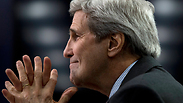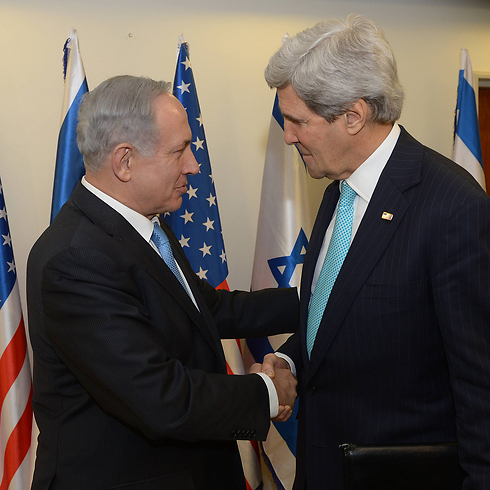
Kerry slams UN rights panel for 'unbalanced focus' on Israel
Secretary of State warns council over 'deeply concerning record on Israel', says it risks undermining its own credibility.
US Secretary of State John Kerry on Monday delivered a vigorous defense of Israel before the United Nations Human Rights Council, urging its members to end what he branded an "unbalanced focus" on Israel that could undermine its credibility.
His remarks came as the Obama administration attempts to blunt complaints that it has not been strong enough in its support for Israel, criticism now centered on its pursuit of a nuclear deal with Iran.
Even as a bitter US-Israel dispute over a possible Iran deal was expected to heat up in Washington later Monday, Kerry affirmed America's steadfast commitment to its top Mideast ally and called on the council to take a more balanced approach toward Israel.
In a speech denouncing rights abuses in places like Syria, North Korea and Ukraine, Kerry spent several minutes on what he called the council's "deeply concerning record on Israel."
"No one in this room can deny that there is an unbalanced focus on one democratic country," he said, decrying the fact that no country other than Israel has a permanent agenda item on the council's schedule. "It must be said the (council's) obsession with Israel actually risks undermining the credibility of the entire organization."
The council frequently targets Israel for criticism in resolutions and investigations, notably over military action it has taken against Palestinian militants in Gaza. A new report commissioned by the council about last year's Gaza war is expected to be released later this month.
Kerry and other US officials have said the Obama administration's commitment to Israel's defense is unbreakable. On Sunday, and again at the council on Monday, Kerry noted the administration has intervened to protect Israel from condemnation at the United Nations and other international forums several hundred times in the last two years.
"We will oppose any effort by any group or participant in the UN system to arbitrarily and regularly delegitimize or isolate Israel," he said. "When it comes to human rights no country on earth should be free from scrutiny but neither should any country be subject to unfair or unfounded bias."
Kerry noted in particular that the human rights council would this year consider a resolution sponsored by Syria denouncing Israel's conduct in the Golan Heights. Kerry said it made no sense to consider this when thousands of Syrians are fleeing to the Golan and many are getting medical treatment there from Israeli physicians.
Kerry's speech to the council was the first of several addresses on Monday that focus on the U.S.-Israel relationship. Later Monday in Washington, the US Ambassador to the United Nations, Samantha Power, and President Barack Obama's national security adviser, Susan Rice, as well as Prime Minister Benjamin Netanyahu, are to speak to America's leading pro-Israel lobby. Netanyahu on Tuesday is to deliver a speech to a joint session of Congress, warning about the threat posed by Iran and arguing against a nuclear agreement that may result from the current negotiations.
The row over Netanyahu's speech to Congress has been waging since it was announced last month and is likely to continue after it has been delivered. Netanyahu arrived in the US on Sunday night, ahead of Tuesday's address, which is being skipped by dozens of Democratic lawmakers, among them Vice President Joe Biden.
Shortly after his speech in Geneva, Kerry was to resume nuclear negotiations with Iranian Foreign Minister Mohammad Javad Zarif in the Swiss city of Montreux.
Those talks are expected to last through at least midday Wednesday, after which Kerry will travel to Saudi Arabia to discuss the talks with the country's new king and then to London where he will brief foreign ministers of the other Gulf Arab states. Both Israel and the Sunni Gulf Arabs have grave concerns about Shiite Iran's nuclear program.











